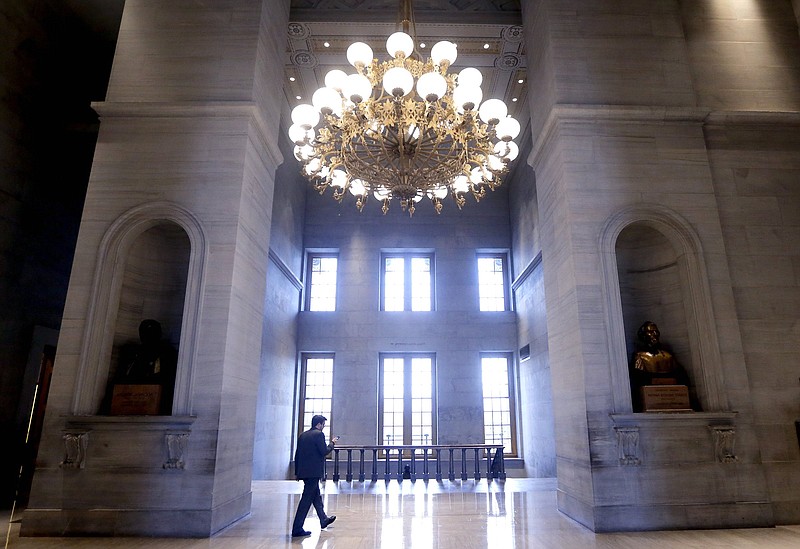If you expect this week's Tennessee General Assembly's special session to review and approve incentives for the state's recently announced Ford plant to get a little sticky, you're not alone.
Consider these two headlines from the last two days:
"Tennessee lawmakers to consider $900 million package for Ford project."
And, "Tennessee Republicans push to enshrine right-to-work laws as unions gain strength amid worker shortage."
The timing is not coincidental. If you think it is, you're forgetting the incredible brouhaha here some years ago when Volkswagen invited worker votes (unsuccessfully) to allow its employees to join the United Auto Workers.
Now the stage is being set again in the wake of Gov. Bill Lee's joint announcement with Ford Motor Co. in September. Ford and South Korea battery maker SK Innovation will build a multibillion-dollar electric truck assembly plant and accompanying battery plant in the rural West Tennessee town of Stanton northeast of Memphis.
For lawmakers' commitment to spend $884 million ($500 million in direct grants to Ford and $383.9 million for attendant infrastructure projects, training and a new Tennessee College of Applied Technology nearby, as well as legal services), Ford has pledged to invest $5.6 billion in the truck and battery factories, which are expected to open in 2025 and create about 5,800 jobs.
The catch for many of Tennessee's supermajority Republican leaders, of course, is whether many or any of those 5,800 workers will swell the numbers of the Volunteer State's union members.
That brings us back to that "sticky" part and the second headline - the one about lawmakers pushing to "enshrine" our right-to-work law "as unions gain strength amid worker shortage."
Back in September, shortly after Ford's announcement, a burning question in Tennessee and Kentucky (where Ford announced two additional battery plants) was: "Would these be union jobs?"
The answer, according to the Detroit Free Press, was: "Maybe. It all depends on the UAW, headquartered in Detroit, and its organizing skill."
The Detroit report continued: "Again and again, Ford executives said they plan to honor the wishes of workers when production is targeted to begin."
Of the UAW's estimated 400,000 dues-paying members, 7,496 of them are in Tennessee, including at the General Motors auto assembly plant in Spring Hill, according to the Detroit paper. Some 20,600 UAW members work in Kentucky.
But the only auto-assembly plant Ford announced will be in Tennessee, meaning Tennessee is where the UAW will be focusing its organizing effort.
Couple that with a statement Monday in Nashville by the No. 2 labor leader in the country as he was addressing other AFL-CIO leaders about Tennessee's right-to-work laws continuing the South's history of trying to take advantage of workers and hurt their ability to make a fair wage.
"Right to work is a direct descendent of Jim Crow and it should have no place in our society, much less in the state Constitution," AFL-CIO Secretary-Treasurer Fred Redmond said during the opening of the Tennessee AFL-CIO annual convention this week. "Workers are fed up and America is taking notice of our collective action. Working people are waking up and understanding the value of labor unions."
That brings us back to lawmakers wanting to "enshrine" Tennessee's right-to-work law, which makes it illegal for workplaces to require mandatory labor union membership for employees as a condition for employment. By "enshrining" it, they mean adding it to the state constitution. Our lawmakers already have approved such a constitutional amendment, and Tennessee voters will decide on it in the November 2022 election.
Redmond is correct that workers across the country are feeling unfairly treated. More than 10,000 John Deere & Co. workers are now in the first major walkout in that company in 30 years. And earlier this month, 1,400 Kellogg's plant workers, including hundreds in Memphis, went on strike over forced overtime even as the company posts rising profits.
But for now, few union organizing efforts are underway in Tennessee - the third least unionized state in the country. Business groups tout this low rate as something that helps Tennessee business recruitment. Of course, if it were just that simple, wouldn't all manufacturers be beating down the doors to get here?
Union leaders, on the other hand, say fewer unions mean less pay. And since Tennessee's per capita income averages nearly 20% below the U.S. average, one must wonder. Further, most of the states with the highest share of non-union workers - repeat, non-union workers - tend to have lower average pay, according to the U.S. Bureau of Labor Statistics.
Before our super-red lawmakers (the same ones who won't let Tennessee have a minimum wage) get themselves all lathered up, we hope you will remind them of some old and new UAW history.
UAW is credited with helping win the five-day workweek, federal minimum wage and health benefits. These days, UAW members employed by Ford, General Motors and Stellantis get profit sharing. When the companies do well, the blue-collar laborers who built the vehicles do well, too. When things are tough, everyone feels the financial pain. The UAW also has expanded its membership to include lawyers, health care workers, engineers and scientific researchers. And during the COVID-19 pandemic, the UAW has been working with companies to shape safety policy and compliance.
We think there's a seat at Tennessee's table for labor unions. Don't let our lawmakers tell you otherwise.
